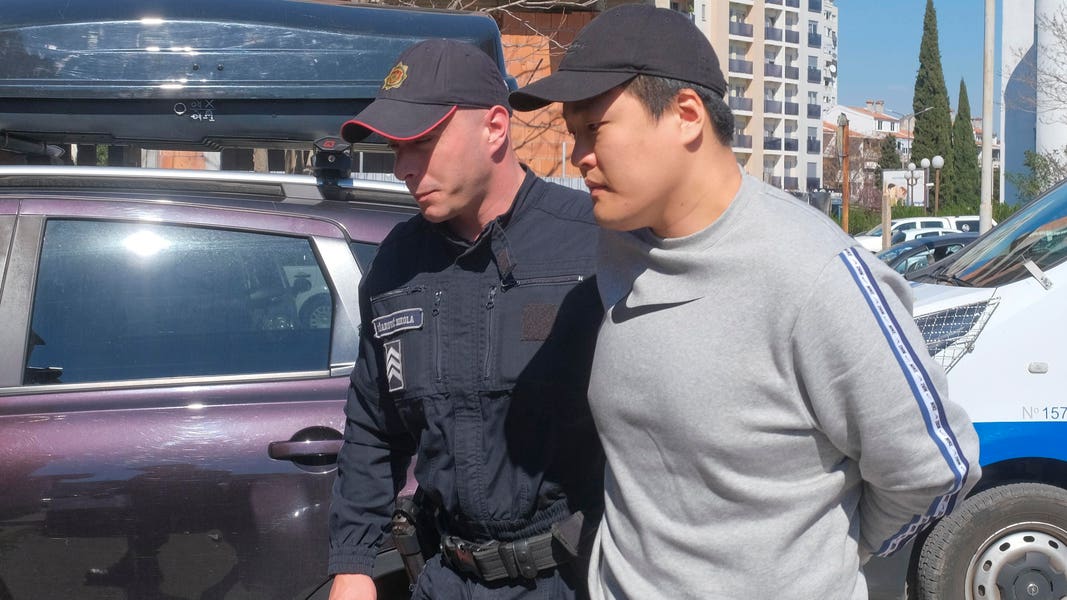
Topline
A civil fraud trial for controversial crypto CEO Do Kwon and his company Terraform Labs begins on Monday, almost two years after the company’s stablecoin tanked in value and wiped out $40 billion in investors’ funds.
Key Facts
The Securities and Exchange Commission sued Kwon and Terraform Labs in February 2023, accusing the company of propping up the stablecoin while misleading investors, claiming its value was controlled by an algorithm and pegged to the price of the U.S. dollar, when in reality, Kwon and other executives were allegedly spending billions to maintain its value and misleading investors about its stability.
Kwon will not attend his civil fraud trial on Monday, as he was released from prison in Montenegro after serving a full sentence for using a fake passport on Saturday, but prosecutors have not returned his travel documents, Bloomberg reported.
Prosecutors in South Korea charged Kwon with violating the company’s Capital Markets Act, and investors in Singapore filed a $57 million class action lawsuit against Kwon and the other Terraform Labs co-founders—but Kwon disappeared from his Singapore apartment before he could be served an arrest warrant.
Kwon was later criminally charged by prosecutors in the Southern District of New York for securities fraud, wire fraud and commodities fraud.
Kwon was finally arrested two months later in Montenegro after attempting to use a forged Costa Rican passport to leave the country, and was eventually sentenced to four months in prison—while both the U.S. and South Korea began to push for his extradition.
A Montenegro court approved Kwon’s extradition to South Korea, but the Balkan nation’s Supreme Court stepped in to overturn the decision last week—potentially paving the way for his extradition to the U.S., which is reportedly favored by the Montenegrin government.
Key Background
Terraform Labs managed two cryptocurrency tokens: TerraUSD (UST), a so-called algorithmic stablecoin pegged to the U.S. dollar, and Luna, a token that users could supposedly exchange for UST at any time. Luna, which operated more like a traditional crypto token like Bitcoin, was designed to be a “stabilizing mechanism” that keeps UST pegged at $1 through an arbitrage system—if UST dropped below $1, investors could buy UST at a discount and trade it for $1 of Luna, thus propping up UST’s value. That distinguished UST from other stablecoins that are designed to stay at $1 and—often controversially—claim to be backed by hard assets. Many cryptocurrency exchanges, including Binance, marketed UST as a safe investment due to its dollar peg. However, the SEC alleges that Kwon took “drastic” steps to manipulate the currency’s value and maintain the peg, including propping the currency up with “billions” of dollars gifted to the Luna Foundation Guard, a nonprofit set up by Kwon. A third party auditor later determined the foundation spent about $2.8 billion to “defend the peg.” After buying into UST, Terraform Labs then encouraged owners to deposit the tokens into the company’s staking pool known as the “Anchor Protocol.” The staking pool advertised a 20% interest rate. According to the SEC’s lawsuit, over 70% of all UST—about $14 billion—was deposited in Anchor Protocol before the token’s collapse. In May 2022, UST slumped below its dollar peg, with its value falling as low as 10 cents in the following week. The price of Luna fell to “close to zero,” according to the SEC, and the regulatory agency estimates investors lost about $40 billion due to the collapse.
Tangent
Terraform Labs also set up a project called the “Mirror Protocol,” a virtual exchange where users could buy and sell securities called “mAssets” that “mirrored” the prices of real stocks. For example, users could trade “mAAPL,” a security that would reflect the actual stock price of Apple, but these mirrored assets did not reflect any “direct or indirect ownership interest” in the company. According to the SEC, these mAssets “tracked the rise or fall in the price of the underlying security, but did not convey any direct or indirect interest in the underlying security.” The SEC first issued a subpoena to Terraform Labs to determine if they were operating an unregulated stock exchange, but Kwon refused to give regulators any documents or testimony about Mirror Protocol.

